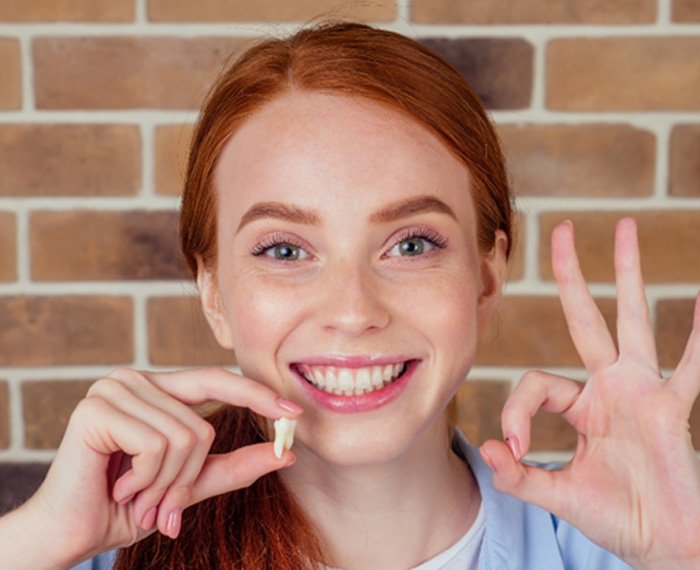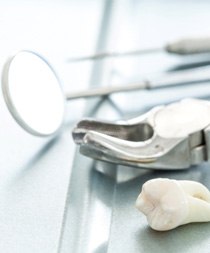Tooth Extractions – Gilbert, AZ
Building a Healthier Foundation For Your Smile
At Desert Springs Dental, we understand that there’s no substitution quite like your natural pearly whites. That’s why we always try to save them whenever possible. In some cases that involve seriously decayed or damaged teeth, we may need to recommend tooth extractions from our emergency dentist in Gilbert in order to prevent the loss of several teeth. In these cases, we can restore the health of your smile and rebuild it with one of our tooth replacement solutions, like a dental implant.
Why Choose Desert Springs Dental for Tooth Extractions?
- Several Sedation Methods Available
- Dental Implant Tooth Replacement
- We Proudly Accept Dental Insurance
Reasons Why Tooth Extractions Are Necessary

There are several situations in which we may suggest a tooth extraction. Some of these include:
- A wisdom tooth is impacted below the gums, causing it to push directly against other teeth.
- Severe tooth decay that can’t be treated with a filling and crown or root canal therapy.
- Gum disease has caused a permanent tooth to become loose.
- Dental trauma has caused a tooth to become so damaged that it can’t be saved.
- Overcrowded teeth prevent you from being able to undergo orthodontic treatment.
The Process of Removing a Tooth

We have two options when it comes to removing a tooth: a simple extraction or a surgical extraction (we will explain more about each next). However, it’s important for our patients in Gilbert to know that our top priority is ensuring you have a positive experience, which is why the first step of the treatment process is always numbing your mouth thoroughly. Plus, we offer sedation dentistry for patients with more complex cases or who struggle with dental-related anxiety.
Back to the procedure, we will intervene with a simple extraction if the tooth that needs to be removed is above the gumline. The process is quite simple: Dr. Shandy Condie will use special tools to gently grab the tooth and rock it loose. Then, she will carefully remove it.
Surgical extractions, on the other hand, are ideal for when the tooth in question is still under the gumline. In that case, we will need to create a small incision in your gums to access the tooth. Sometimes, we will separate the tooth into smaller pieces so removing it is more efficient. Don’t worry – you won’t feel a thing!
Tooth Extraction Aftercare

Simply put, caring for your mouth properly following a tooth extraction is of the utmost importance. To ensure you don’t have any complications during the recovery period, we recommend:
- Sticking to soft foods, like vegetable soup and yogurt.
- Keeping your mouth clean (we will provide you with instructions on how to do this).
- Not smoking, using a straw, or spitting.
- Refraining from physical activities, like running or lifting heavy objects.
- Drinking plenty of water to stay hydrated.
- Placing a cold compress against the outside of your cheek in 10-minute intervals.
- Taking OTC pain medication as instructed.
Want to learn more about tooth extractions, from the process to the cost? Then give our team a call!
Understanding the Cost of Tooth Extractions

When you’re considering having a tooth extracted, you’ll naturally want to have an idea of how much you’ll need to pay for the treatment. We can review the numbers with you during your initial consultation; you can count on us to give you an estimate of the overall cost. Below is a brief look at some of the variables that can help determine the price of a tooth extraction. Remember that you can always talk to our team if you have further cost-related questions.
Factors That Can Affect the Cost of a Tooth Extraction

Your tooth extraction won’t be exactly the same as another patient’s. As such, there are a number of factors that could end up affecting the amount that you pay for the treatment:
- Where the Tooth is Located: Since the back teeth have multiple roots and are located in a part of the jaw where the bone is thicker, extracting them tends to be more difficult, which can affect the overall cost.
- How Many Teeth Need to Be Removed: While many patients will only need to have a single tooth removed, others may require multiple extractions. The more teeth that need to be removed, the more you can expect to pay for the procedure.
- Whether Surgery is Needed: When comparing surgical extractions to simple extractions, surgical ones tend to cost more.
- Whether Sedation is Used: Not everyone will need sedation as part of their tooth extraction, but it could be worth the additional cost for patients who have dental anxieties.
Does Dental Insurance Cover Tooth Extractions?

A tooth extraction is often a very important step for protecting your oral health, so it should come as no surprise that it is typically at least partially covered by dental insurance. That said, the amount of coverage that you receive can vary from plan to plan. In many cases, your insurance company may pay around 50% of the total cost of the procedure, but this percentage isn’t necessarily written in stone.
If you reach out to your dental insurance company, they will be able to explain the coverage that’s available for tooth extractions. You can also talk to our team if you need someone to clarify the details of your plan. If you need to have an insurance claim filed, we can handle the paperwork for you.
How to Make Tooth Extractions Affordable

Maybe you don’t currently have a dental insurance plan to help you pay for a tooth extraction. If that’s the case, there is another option worth considering: third-party financing. If you sign up for a CareCredit financing plan, you can break up the cost of your dental care into smaller monthly payments. Sometimes it’s easier to fit a treatment into your budget when you don’t have to worry about paying for everything all at once.
Feel free to reach out to us if you have any questions or concerns about the cost of a tooth extraction. Our team is ready to help you!
Tooth Extractions FAQs
Can I Smoke After Getting a Tooth Extracted?
Nicotine and tobacco products of every variety can restrict blood flow to the mouth and delay healing, increasing your chances of complications during aftercare. Moreover, the suction involved in smoking and vaping can pull your tooth extraction clot out of place, causing dry socket.
For these reasons, we would strongly recommend against using any kind of tobacco product after a tooth extraction for at least two weeks. If you’ve struggled to quit in the past, let us know and we’ll talk to you about options that could help.
How Should I Prepare for My Tooth Extraction?
Preparing for your tooth extraction is just as important as the aftercare, so here are a few things you should keep in mind before your procedure.
We’ll give you detailed instructions for how to prepare for the treatment when we meet you, including the medications you need and what you should eat. You should use this opportunity to talk to us about any questions you have about the tooth extraction to ensure that you’re completely prepared.
In any case, you should make sure that you have someone to drive you to and from your appointment, especially if you’re receiving sedation.
Does Getting a Tooth Extracted Hurt?
If you’re concerned about the prospect of pain during a tooth extraction, don’t worry—the procedure will be entirely painless. We are going to make sure to numb your mouth completely before giving you any kind of dental care, so the most that you’re likely to feel during the treatment is a slight pressure.
Most people are a bit sore after their treatment, so being careful about aftercare is important to ensure your comfort. Take care not disturb the emerging clot, keep the area clean to prevent infection, and take any medication we prescribe you as directed.
Can I Leave the Space Empty After a Tooth Extraction?
If you remove a tooth that people can’t see, you may be tempted to simply leave the space empty. However, this can cause problems in the long run.
Even missing a single tooth can cause the surrounding teeth to become misaligned, can impede your ability to chew food properly, and even make speaking normally considerably more difficult. It is therefore crucial that you replace any tooth that you’ve had removed, either with a denture, dental bridge, or dental implant.







